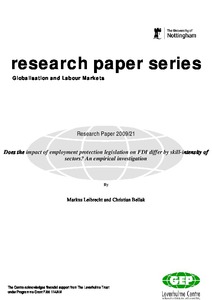Does the impact of employment protection legislation on FDI differ by skill-intensity of sectors? An empirical investigation
"In line with previous literature this paper finds that strict employment protection legislation has a negative impact on the volume of inward Foreign Direct Investment. Rigid labor markets result in high adjustment and exit costs which deter foreign investments. We also find that the deterrent...
| Main Authors: | , |
|---|---|
| Institution: | ETUI-European Trade Union Institute |
| Format: | TEXT |
| Language: | English |
| Published: |
Nottingham
2009
University of Nottingham |
| Subjects: | |
| Online Access: | https://www.labourline.org/KENTIKA-19187181124919053639-Does-the-impact-of-employment-.htm |
| Summary: | "In line with previous literature this paper finds that strict employment protection legislation has a negative impact on the volume of inward Foreign Direct Investment. Rigid labor markets result in high adjustment and exit costs which deter foreign investments. We also find that the deterrent effect of inflexible labor markets is larger for industries with relatively high shares of low-skilled workers employed. Our findings are consistent with the view that governments can support structural change by tightening labor market regulations which especially deters inflows of FDI into low-skill industries. To avoid a drop in high-skill FDI host countries should simultaneously improve other location factors especially relevant for the latter." |
|---|---|
| Physical Description: | 32 p. Digital |

